Wild Campus blog
Final Wild Campus Blog 31/05/2023
As we near the end of the project, we would like to take the time to reflect on the project as whole, what we have achieved and look forward to what comes next. At the start of the project in 2020, Cirencester College (CC) and the Royal Agricultural University (RAU) joined forces to begin creating a more wildlife friendly area by developing habitats, enhancing biodiversity, and investing in the health and wellbeing of the local community. Wild Campus was match funded by the European Regional Development Fund (ERDF) and began with an ecologist from Wild Service doing an initial ecological enhancement plan, and the deliverables for the project were borne from this. This included:
- Replacing or improving outside lights in line with Bat Conservation Trust guidance to enhance foraging habitats for bats.
- Planting 1000m2 of wildlife friendly hardy native shrubs to provide more corridors for small mammals, reptiles and amphibians.
- Planting 3000m2 of wildflowers where insects can forage and hence enhance bat foraging sources as they feed on insects.
- Diversifying 4 hectares of lawn, leaving long grass, providing further food sources and cover for small mammals, amphibians, reptiles and insects.
- Installing 5 hedgehog shelters and 5 reptile/amphibian hibernacula.
- Planting native species to enhance 5 existing ponds for amphibians, water fowl and aquatic invertebrates.
- Thinning woodland to enhance ground flora and create refugia to provide better habitat for small mammals, amphibians and bats.
- Planting a heritage orchard, further diversifying insect, bat and nesting bird habitat and providing food sources for small mammals, insects and birds.
- Installing 150 bird and bat boxes to enhance roosting and nesting opportunities.
COVID-19 restrictions meant that, most work was delayed until 2021. In 2020 plans were made to diversify the grass lawns, and ‘no mow’ areas were assigned. The summer of 2021 brought phase one of shrub planting, various wildlife surveys, building of hibernacula and hedgehog shelters and the beginning of installing the bird boxes. Conservation Club was started by Liam Collins and Rebecca Elton who joined the project in 2021, and students of the RAU were encouraged to get involved with the project. The grounds team were brought in to assist with delivery and maintenance of the newly established habitats. Deb Govier joined the project team as Project Manager in November 2021.
Cirencester College completed their ‘Axehead’ area in 2020, and enhanced the area in 2021, this area will continue to be improved and enjoyed by CC staff and students and Stuart Williams, who looks after the area. In January 2022, phase one of the heritage orchard was planted, with students from the RAU completing the work under the supervision of Rebecca Elton and Dr Ian Grange, as a part of the Conservation degree offered at the RAU. More hibernacula were installed by Conservation Club, and they continued their surveying efforts. 2022 saw the first research projects from data collected from Wild Campus, including student assignments on reptile hibernacula use, and mammal preference of ecotones on the RAU site. The first research paper published was from Dr Kelly Hemmings, Rebecca Elton, and Dr Ian Grange, titled ‘No-mow amenity grassland case study: Phenology of floral abundance and nectar resource’ in Ecological Solutions and Evidence (2022) (tinyurl.com/5d56j3d3). Wildflower areas were sown on both sites this year, and CC completed their bird box installation. Wild Campus was also awarded Environmental Project of the Year by Cirencester Chamber of Commerce, Business and Community Awards. The most costly and largest effort began in the improvement of the lighting around the RAU and CC sites. This involved making the lights a warmer colour and more downward facing, creating a darker corridor for bats. Rebecca Smith and Angharad Webb joined the project, in the roles of Project Technician and voluntary Hedgehog Ambassador respectively. Angharad ran the Hedgehog Friendly Campus, for which we completed various tasks to be awarded our Bronze level award at the end of 2022. The bird and bat box installation were completed with help from the arborist team from Id Verde, and the RAU maintenance team who put up the house martin boxes around the accommodation blocks.
2023 brought about our last 5 months of the project for ERDF funding, and the heritage orchard and hardy shrub planting was completed by students. Phase two of the hardy shrub planting was supervised by Rebecca Smith and included three botanical species, Chamomile, Lemon Thyme, and Elderflower with the intention to create more flavours of the RAU Gin. Along with this, extra lavender was planted and harvested and a distilling station and introductory session was led by Jonathon Code. From the success of this session, a proposal has been raised for a permanent distilling station to be installed in the labs. Signs can be seen around both sites, describing the environmental improvements to the specific areas.
The end of the project had the team completing a summative assessment, for which a maintenance plan was written, that should keep the efforts from the project alive for 15 years, until 2038.
The Wild Campus team would like to thank Teresa North (RAU Project Sponsor), Jim Grant (CC Sponsor), Sarah Morton, Dr Kelly Hemmings, Dr Ian Grange, Liam Collins, William Melville, Cotswold Turf Care, ID Verde, Jacquelyn Jenkins, Jane Dowdeswell, Katey Harris, Helen Tonks, Stuart Williams, Angharad Webb and all students involved with the project and Conservation Club for all their help and patience during the project.
Written by Rebecca Elton, Deb Govier and Rebecca Smith.
Artwork by Jessica Paget Illustrations.
Date: 23/05/2023
The Wild Campus team has been busy since the last blog in November, over the winter months there was a Hedgehog Friendly Campus (HFC) fundraising event with guest speakers and students from Cirencester College attending. The hard graft of students on the Conservation Club saw us win the litter pick challenge after finding the most unusual object prize with pants, a gun cartridge, and a mini fridge being collected! All these efforts were noticed as the RAU was awarded the HFC Bronze Award in February 2023.
There were additional activities completed during this period, as winter is the prime time for tree planting an additional 400 hardy shrub species were planted across campus bringing the total to 750+. Botanical species such as Lemon thyme, Camomile, and Elderflower were included and will be distilled and used to flavor the RAU Gin made by Ryan Hanson, the Associate Director of Commercial Services. The heritage orchard also had an extension, with 31 in total there is a variety of local pear, plum, and apple species.
Nectar-rich beds were planted by first and second-year wildlife students as part of their supervisory module. These beds were placed by the memorial garden near the hockey pitches. Species such as Geranium, Blue globe, and Bowles mauve will entice bumblebees while the Oregano and Lesser calamint will draw in Solitary bees.
October 2022 saw the second harvesting of lavender, to diversify the use of this an introductory distilling session was headed up by Jonathan Code, Senior Lecturer in Sustainable Land Management. Students were given a step-by-step guide on how to distill the raw material into a sellable essential oil product. The success of this session has resulted in a preliminary proposal being put forward for a permanent distilling section in the new RAU labs.
2023 brought lots of visitors to the campus during open days for prospective students, Wild Campus lead a tour and bug hotel building activity with Capel Manor students. This was erected by the outside seating area of the library. Wildlife enthusiast Theano Manoli, Library Learning Resource Advisor, created a colorful and informative Wild Campus-themed library display for the month of May.
As the FWAG Zero Dig project hits the ground running students assisted with hedge planting along the back edge of the field. The No-Mow project also continues into its 3rd year with some slight adaptations to locations on-site, with the intention to take this research nationally.
With summer just around the corner, it is wonderful seeing the House Martin boxes being utilized by the populations returning from their winter stint in South Africa. The camera trap footage from April 2023 has shown an increased presence of Roe and Muntjac deer, Badgers, Foxes, and birds.
Over the summer of 2023, volunteers from the student body will continue the surveying efforts supporting the continuation of Wild Campus by completing reptile and breeding bird surveys and much more on campus.
Changes will be taking place in September as Rebecca Smith, Project Technician of Wild Campus will hand over the leadership role of Conservation Club to second-year students George Haynes & Amy Hudson. Wild Campus feel that they have shown commitment to the project and have the knowledge and capabilities to take the club forward in the future.
Wild Campus would like to offer condolences to Cirencester College and the family of Jim Grant, Principle of Cirencester College, and an advocate of the project after his passing.
Written by Rebecca Smith.
Date: 15/11/2022
Over the summer, the campus was missing the buzz of student life although the Wild Campus team was still plodding on focusing on habitat enhancement. A few days were spent in the roaring sun removing Common Ragwort (Senecio jacobaea), as you can imagine back-breaking work but a much-needed activity to complete. Although Common Ragwort is an invasive growing plant that causes toxicity symptoms when ingested by some livestock, it also provides a very high nectar source value to pollinators. This is just one of the findings in the first ‘Wild Campus’ based study, published by Dr Kelly Hemmings, Rebecca Elton and Dr Ian Grange. A link to the paper can be found here: https://besjournals.onlinelibrary.wiley.com/doi/10.1002/2688-8319.12179.
The beginning of summer saw us visiting some local primary schools to spread the word and educate about conservation and having respect for the countryside, as well as teaching the children about hedgehogs and what to do if they ever find an injured one! This was all part of our Hedgehog Friendly Campus Project. All our efforts over the last couple of years have not gone unnoticed, at the end of July, Wild Campus attended the Cirencester Business & Community Awards where we were presented with the Environmental Project of the Year award! This was obviously a tremendously proud moment for all involved.
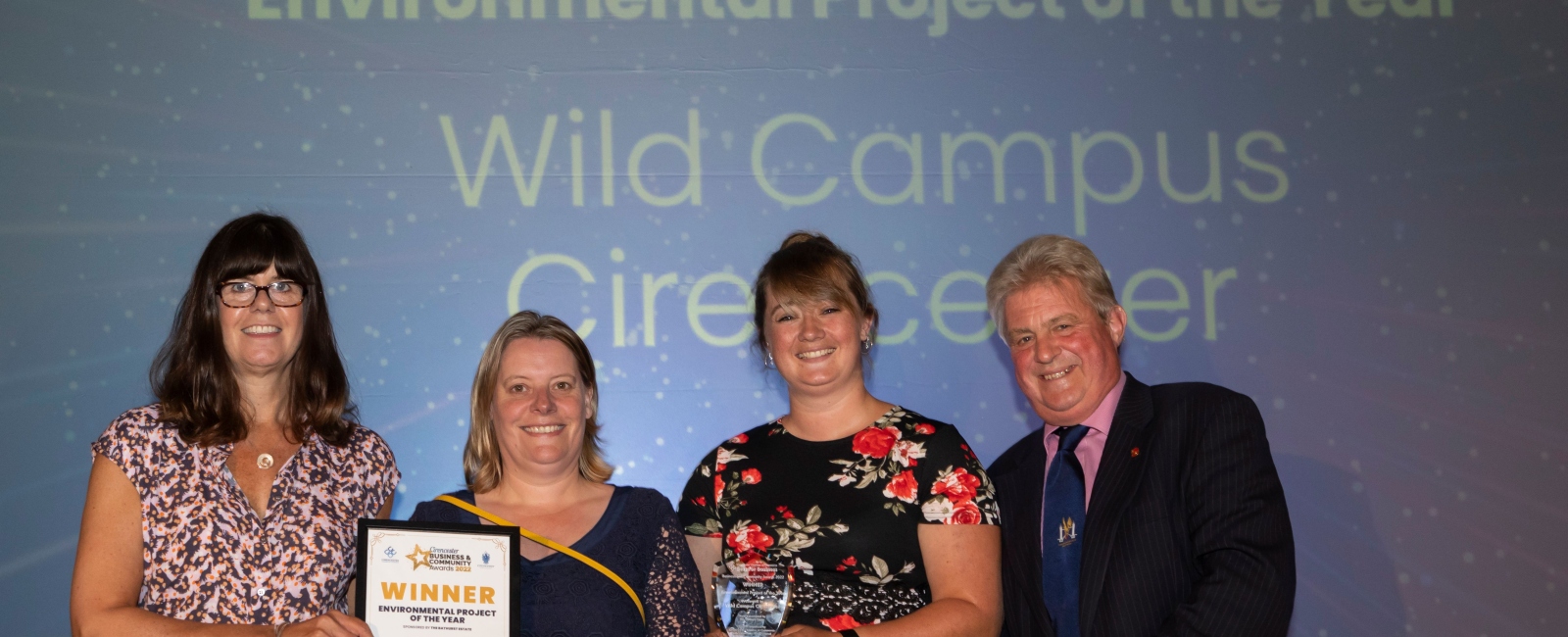
Since the project kicked off the RAU campus has been gradually enhanced for the amelioration of wildlife. During summer camera traps and hedgehog survey tunnels were set up at strategic locations across campus and we were able to confirm the presence of species such as hedgehogs, foxes, badgers, and roe deer all of which have been making use of the biological and habitat corridors found across campus.
As we draw the curtains on summer and welcome the chilly embrace of autumn it has been all hands on deck here at Wild Campus. With the return of students we have seen Conservation Club hit the ground running with the new first-year students joining in on the activities. We kicked things off by building another bug hotel located on Bled lawn over in reptile corner.
Autumn calls for the start of winter bird surveys, the data of which will be uploaded to the British Ornithology Trust (BTO). Again such activities are completed with the help of Consersation Club, we meet outside Porters lodge every Wednesday at 1 pm and everyone is welcome!
It was also great to see that solitary bees have made use of the bee hotels which were put up earlier in the year by students in the Wildlife Conservation course. Watch this space as there are many scientific questions waiting to be answered about which sites the species prefer and why.
We are pleased to welcome Rebecca Smith as an assistant project technician, who we know will bring lots of passion and knowledge to the project. Angharad Webb has taken over the reins of Hedgehog Friendly Campus, a project in partnership with the British Hedgehog Preservation Society to help raise awareness of these declining mammals and to make our campus a better habitat.
Date: 31/05/2022
Hedgehog Update!
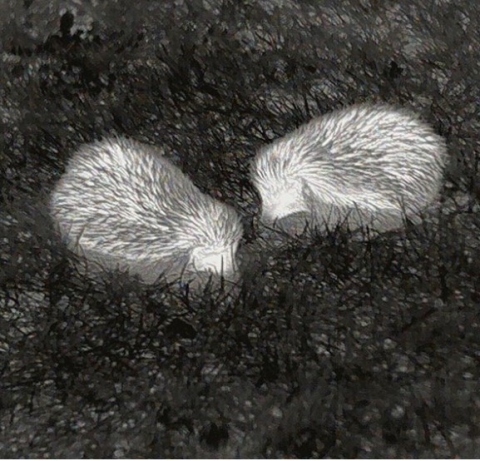
It’s estimated at one time in the UK there were as many as 30 million hedgehogs, now it is thought as little as 1.5 million remain. The Wild Campus project has signed up to participate in the hedgehog friendly campus, dedicated to enhancing habitat and awareness for hedgehogs across the UKs education districts. The hedgehog friendly campus works alongside the British Hedgehog Preservation Society which is a BHPS funded award programme supporting schools, colleges and universities that make impactful changes for hedgehogs
Staff and students have been surveying the RAU campus using a variety of surveying techniques such as torch search, ink tunnels and thermal imaging cameras. The project was lucky enough to be loaned thermal imaging scopes from John Matthews, brand ambassador for Infiray UK which gave the team their best results with up to ten hogs seen on campus in a single night, highlighting the RAU as a haven for one of the UKs most declining mammals.
Wild Campus will be working with schools and students in the coming months to spread the word about hedgehogs and the wild campus, educating young minds on the increasing risks for hedgehogs, what to feed them and what to do when they find a sick or injured hedgehog. Spreading awareness to the wider public is crucial for hedgehog conservation and there are a variety of ways people can help in their own gardens and become a hedgehog hero.
Check links below for more information:
If you’ve found an injured hedgehog: https://www.britishhedgehogs.org.uk/found-a-hedgehog/
Wild Campus Instagram: https://www.instagram.com/wildcampusciren/
Hedgehog Friendly Campus: https://www.britishhedgehogs.org.uk/hedgehog-friendly-campus-2/
Create a hedgehog friendly garden: https://www.britishhedgehogs.org.uk/creating-wildlife-garden/
Date: 31/03/2022
The Wild Campus project is developing wildlife habitats across the Royal Agricultural University and Cirencester College, connecting wildlife populations, enhancing biodiversity, whilst investing in community wellbeing. Initially due to start in 2019 the project was delayed by one year because of covid restrictions. It finally began to take shape in May 2020 with students from the British Wildlife Conservation course hired to help see the project reach its targets set out by the European Regional Development Fund.
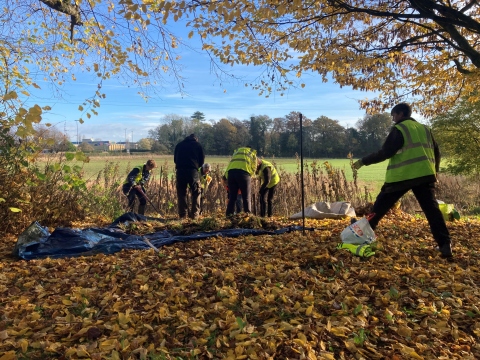
Two years on and the project has made a significant difference across all campuses, wild areas on the edge of sports pitches have encouraged plant diversity and wildlife, hardy shrubs have provided rich nectar for pollinating insects and the bird boxes installed have been occupied, nests made and eggs laid. It is projects like the Wild Campus that are helping nature bounce back and with one more year left on the project there is still much work to do.
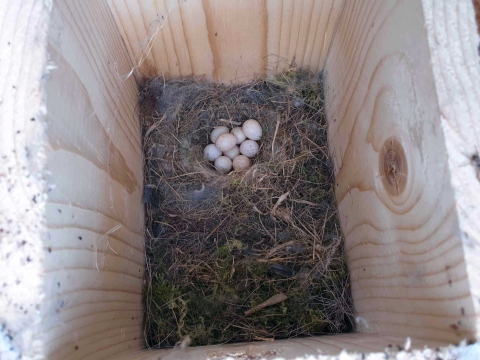
The project has so far dedicated 4ha of ‘no-mow’ grass sward diversification with more to be added this year. Over 1000 hardy shrubs, trees and hedges have been planted across the RAU and Cirencester college campuses with around another 1000 hardy shrubs due to be planted. Up to 3km2 of wildflowers have been sown across both sites, including the Alliston centre and more is to be sown this year further increasing the pollen rich nectar, encouraging insects, birds and mammals.
150 bat and bird boxes will be installed by the end of the project, including kestrel and woodpecker specialist boxes, as these species are regularly seen at the RAU. Fifty house martin nests will be installed and encourage our summer visitors away from nesting on the main campus and accommodation buildings and possibly bring more to the campus. We have so far built three of five reptile winter refuges which are already showing positive results. Two of five hedgehog homes have recently been constructed and we have joined the hedgehog friendly campus campaign to help the declining hedgehogs bounce back and finally the lighting around campus is due to be changed to bat friendly lighting to help movement between populations of declining bat species.
Now spring is here we can start to survey the wildlife around campus and get a better idea if the project has influenced wildlife in the two years it has been running. We have previously surveyed butterflies and moths, the night and day pollinators. Reptile surveys are currently underway as well as bird surveys which are conducted all year round. From May to November the project and students will be surveying for hedgehogs in a variety of ways and there are also cameras placed over campus ready to snap any mammals that pass by.
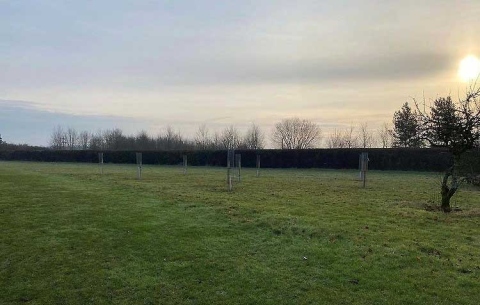
This work isn’t just completed by the employees of the Wild Campus, students from all courses are encouraged to get involved and join the conservation club every Wednesday afternoon. Anyone who wishes to come along can be a part of lasting legacy at the RAU which will benefit wildlife, students and the local community for years to come. If you wish to be involved, or have any questions please email wild.campus@rau.ac.uk or follow our Instagram @wildcampusciren and get in touch. We look forward to hearing from all the naturalists and wildlife enthusiasts who want to do their bit.
By Liam Collins